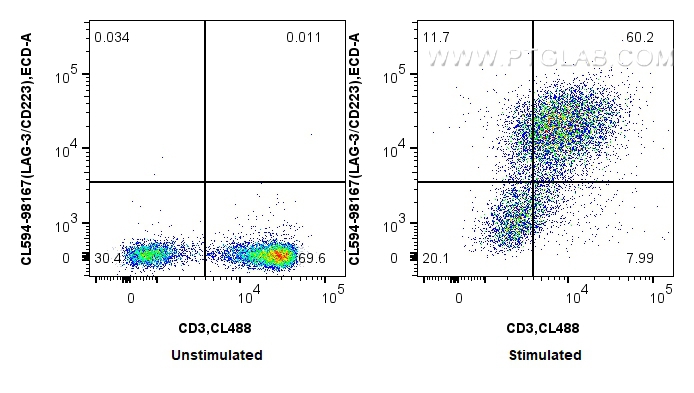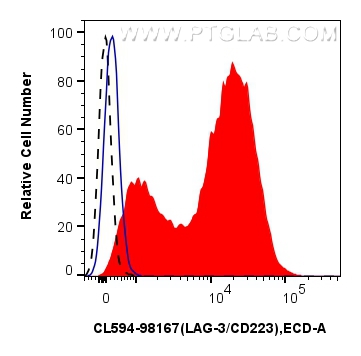验证数据展示
经过测试的应用
| Positive FC detected in | Anti-CD3/CD28 treated mouse splenocytes |
推荐稀释比
| 应用 | 推荐稀释比 |
|---|---|
| Flow Cytometry (FC) | FC : 0.25 ug per 10^6 cells in a 100 µl suspension |
| This reagent has been tested for flow cytometric analysis. It is recommended that this reagent should be titrated in each testing system to obtain optimal results. | |
| Sample-dependent, Check data in validation data gallery. | |
产品信息
CL594-98167 targets LAG-3/CD223 in FC applications and shows reactivity with mouse samples.
| 经测试应用 | FC Application Description |
| 经测试反应性 | mouse |
| 免疫原 |
CatNo: Eg1220 Product name: Recombinant Mouse LAG-3/CD223 protein (His Tag) Source: mammalian cells-derived, pHZ-KIsec-C-6*HIS Tag: C-6*HIS Domain: 24-442 aa of NM_008479.2 Sequence: GPGKELPVVWAQEGAPVHLPCSLKSPNLDPNFLRRGGVIWQHQPDSGQPTPIPALDLHQGMPSPRQPAPGRYTVLSVAPGGLRSGRQPLHPHVQLEERGLQRGDFSLWLRPALRTDAGEYHATVRLPNRALSCSLRLRVGQASMIASPSGVLKLSDWVLLNCSFSRPDRPVSVHWFQGQNRVPVYNSPRHFLAETFLLLPQVSPLDSGTWGCVLTYRDGFNVSITYNLKVLGLEPVAPLTVYAAEGSRVELPCHLPPGVGTPSLLIAKWTPPGGGPELPVAGKSGNFTLHLEAVGLAQAGTYTCSIHLQGQQLNATVTLAVITVTPKSFGLPGSRGKLLCEVTPASGKERFVWRPLNNLSRSCPGPVLEIQEARLLAERWQCQLYEGQRLLGATVYAAESSSGAHSARRISGDLKGGHL 种属同源性预测 |
| 宿主/亚型 | Rabbit / IgG |
| 抗体类别 | Recombinant |
| 产品类型 | Antibody |
| 全称 | lymphocyte-activation gene 3 |
| 别名 | CD223, LAG-3, 241294E11, LAG 3, Lag3 |
| 计算分子量 | 57 kDa |
| GenBank蛋白编号 | NM_008479.2 |
| 基因名称 | CD223 |
| Gene ID (NCBI) | 16768 |
| 偶联类型 | CoraLite®594 Fluorescent Dye |
| 最大激发/发射波长 | 588 nm / 604 nm |
| 形式 | Liquid |
| 纯化方式 | Protein A purification |
| UNIPROT ID | Q61790 |
| 储存缓冲液 | PBS with 0.09% sodium azide, pH 7.3. |
| 储存条件 | Store at 2-8°C. Avoid exposure to light. Stable for one year after shipment. |
背景介绍
Lymphocyte activation gene 3 protein (LAG-3), also known as CD223, is a type I transmembrane protein belonging to the immunoglobulin superfamily (PMID: 1692078). It is a CD4-related molecule that binds MHC class II with high affinity (PMID: 1692078; 9159144). LAG-3 is expressed on activated T and NK cells. Besides, natural CD4(+)CD25(+) Tregs express LAG-3 upon activation (PMID: 15485628). LAG-3 negatively regulates T-cell function and homeostasis, and contributes to the suppressor activity of Tregs (PMID: 14644131; 15485628).
实验方案
| Product Specific Protocols | |
|---|---|
| FC protocol for CL594 LAG-3/CD223 antibody CL594-98167 | Download protocol |
| Standard Protocols | |
|---|---|
| Click here to view our Standard Protocols |



